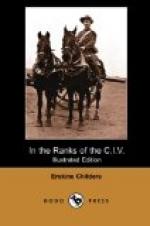July 28.—Reveille at six. After waiting in uncertainty for some time we were left, with the Staffords from Hunter’s column, to guard the town, while the other troops moved off. We camped just outside the town, and there was a rush for loot directly, of course only from unoccupied houses, whose rebel owners are fighting. Unhappily others had been there before us, and the place was skinned. But we got a Kaffir cooking-pot, and a lot of fuel, by chopping up a manger in a stable. My only domestic loot was a baby’s hat, which I eventually abandoned, and a table and looking-glass which served for fuel. But we found a nice Scotch family in a house, and bought a cabbage from them. There was a dear old lady and two daughters. Williams dropped two leaves of the cabbage, and got a playful rebuke from her. She said he must not waste them, as they were good and tender. By the way, we bought this cabbage with our last three-penny bit. We had sovereigns, but they are useless in this country, for there is no change. These people told us that they had been ten months prisoners (at large) of the Boers. Their men had gone to Basutoland, like many more. They had been well treated, and suffered little loss, till the advent of the conquering British, when forty or fifty hens were taken by Highlanders at night.
A lovely warm afternoon, and for a wonder freedom till four, the first spell of it for weeks. Went to a puddle some way off, near a Kaffir kraal, and washed. Some women came with calabashes for water, and I tried to buy the bead bangles and waist-lace off a baby child, but failed. Then I invaded the kraal for meal and chickens, but failed again. I never thought, when I visited Earl’s Court a year ago, that I should look on the African original so soon. Round mud hovels, with a tall plaited-straw portico in front. Most of the men look like worthless loafers; the women finely-built, capable creatures.
Heavy firing has been going on all day, mostly with lyddite, on our side, by the sound. You can see the shells bursting on the top of a big kopje.
This is a funny little place: pleasant cottages dotted round in desultory fashion, as though the town had been brought up in waggons and just tipped out anyhow. Half the houses are empty and gutted; we are all going to sleep in houses to-night. There has been a row about looting a chemist’s shop; our fellows thought he was away with the Boers, but he turned up in the middle. There were some curious bits of plunder.
We are much disappointed at being left out of the fighting to-day, but it’s only natural. We are only half a battery, and have no reserve ammunition, actual or prospective, for some time.
I have struck my last match. I have now to rely on cordite, which, however, only acts as a spill. You get a rifle cartridge (there are plenty to be got, the infantry seem to drop them about by hundreds), wrench out the bullet and wad, and find the cordite in long slender threads like vermicelli. You dip this in another man’s lighted pipe, when it flares up, and you can light your own.




